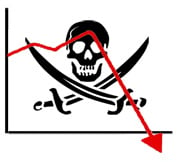 Blocking sites is one of the most popular anti-piracy mechanisms of recent times. The practice is now commonplace in the UK, Europe, and Australia and, if entertainment industry groups get their way, it’ll soon be installed in Canada too.
Blocking sites is one of the most popular anti-piracy mechanisms of recent times. The practice is now commonplace in the UK, Europe, and Australia and, if entertainment industry groups get their way, it’ll soon be installed in Canada too.
While most regions with blocking legislation carry out their work with enthusiasm, perhaps surprisingly it’s Russia setting the standards. With almost constant amendments to copyright law, the country is able to block pirate sites, mirrors, and proxies in a very short timeframe indeed. And it has been doing so, in huge numbers.
According to data shared with Izvestia by local telecoms watchdog Rozcomnadzor, in 2017 Russia blocked a staggering 8,000 pirate sites, more than any other country on the planet. In a clear sign of the way things are going, that figure represents a four-fold increase over the 2,000 sites that were blocked on copyright grounds in 2016.
While blocks can be authorized for infringement of copyright on everything from music to software and from books to TV shows, it is the movie industry leading the way in volume terms. In 65% of cases of site-blocking in 2017, the requests came from companies involved in the production and distribution of films.
Sheer volume aside, there’s nothing really surprising about the site-blocking movement in Russia. However, it differs from most other regions when it comes to assessing its usefulness.
Groups in many other countries have claimed that site-blocking is effective in reducing visits to pirate sites and even reducing piracy itself, but the majority steer clear of claiming that it actually does anything to increase sales. Not so Russia.
According to data from Russia’s Cinema Foundation cited by Rozcomnadzor alongside site-blocking statistics, last year “the aggregate box office of the national film distribution” grew by 10.9% amounting to 53.6 billion rubles [US$927.3m], up from 48.4 billion rubles [US$837.3m] in 2016.
In addition, the telecoms regulator said that cinema attendance across the country had increased by 11.4% over the previous year.
A court process is required to block infringing sites that fail to cooperate when rightsholders ask for content to be taken down. Those that push the boundaries by refusing to remove content on multiple occasions can find themselves blocked on a permanent basis.
In 2017, a total of 530 sites were added to Russia’s permanent blacklist, up from ‘just’ 107 sites in 2017. In addition, 459 pirate site “mirrors” were blocked by ISPs with no hope of reprieve. Following changes to the law last October, permanently blocked sites are also removed from search engine results.
But while the current system presents no significant obstacles to having many thousands of sites blocked during the course of a year, Russian authorities want more anti-piracy tools in their arsenal. New proposals would see pirate sites blocked without the need for any court process at all.
It’s already possible to have mirror sites blocked without a separate process but if the Ministry of Culture has its way, copyright complaints issued to hosting services and sites that go completely unanswered without deletion of content could suffer the same fate.





